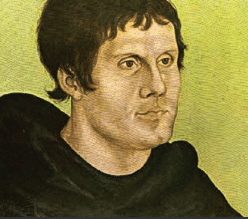It is widely believed that when the British surrendered at Yorktown near the end of the American War of Independence, the British band played “The World Turned Upside Down,” A new form of republican government, with the philosophy of everyone being equal, was about to take shape on the world stage. Now, just imagine Luther in the year 1516 teaching in the quiet town of Wittenberg, Germany. He is about to make history, but he doesn’t know it; he is literally going to turn the world upside down.
Before Luther, there were attempts to point the people back to the truth of God’s Word, as it had been lost over time because of church council decisions and popish decrees. Many of those who promoted reform were killed over these attempted changes. These included people like Jon Hus, Jerome of Prague, and others who were known as precursors to the Reformation that Luther would eventually build on.
The best way to understand the totality of Luther’s impact is to understand the times he lived in. The European landscape was one where the Roman Catholic Church and the royalty were closely tied together, and if anything, the popes dominated the rulers. There was a tension in this relationship, but the monarchs did not want to be excommunicated or have the ban pronounced on their kingdoms (a ban is a declaration by the pope that no sacraments were to be performed by the priests in a certain town or region, until the ban is lifted). It was the pope’s way to control the monarchs. This hampered free thinking for all. Everything that was taught had to conform to the Catholic Church’s teachings and the king’s placards (decrees). Anyone who did not yield risked death.
There was a tiny merchant (middle) class. There were a few rich landholders and nobility, but the vast majority of the people were poor. It was a time of subsistence living where malnourishment, disease, and death lingered everywhere. Whatever class a person was born into was where that person was most likely going to stay. It was unlikely that someone would travel more than ten miles from where he or she born in their whole lifetime. Whatever one’s father did for work was most likely going to be the son’s vocation. Almost everyone was illiterate, including many priests, and the people were forbidden to read the Bible. There was not much hope for people, but whatever hope was offered by the church was probably going to be tainted by some sort of works righteousness. This was the time and culture in which Martin Luther was living in 1516.
Luther’s conscience drove him to search for truth in the Scriptures. He knew he wasn’t right with God following the teachings and ways of the Catholic Church. Peace and hope would finally come through study of the book of Romans. This is when he would come to a right understanding of grace and salvation in the work and person of Christ. When he understood this correctly, his mind was opened up to a whole new way of thinking and understanding Scripture.

When Martin Luther nailed the 95 theses to the Wittenberg Castle Church door 499 years ago, he was looking to make some reforms in the Catholic Church, primarily concerning indulgences, and the spiritual character of the Christian faith. These were to be some items for debate, almost an academic exercise. God directed that this small act was going to call His people back to Him but also change the world. Catholic monarchs would turn on their relatives who were sympathetic to Luther’s teachings. They would even plan assassination attempts or go to war. Thousands upon thousands of people were burned at the stake or killed in some other manner for their beliefs in doctrines of the Reformation. Bibles were printed in the common language of the people, which caused a mass increase in the number of people who would start to learn how to read. People would question the current relationship between the church and the state. Nations would rise as distinct entities. Education for the masses would start to blossom. This would eventually lead to the rise of middle class. When God’s Word was opened it changed how people thought about everything.
Many others followed Martin Luther and furthered developed biblical ideas that spoke to a whole host of subjects including doctrine, politics, nationalism, academics, economics, relationships, and practical life applications. The fall 1997 issue of Life magazine named Martin Luther as the third most import person of the last millennium. As Christians, we don’t need to look to Life to validate our thoughts concerning Martin Luther, but it does give us perspective of how important he was to the whole world. It is arguable that this was the most significant event to change Western civilization from a medieval mindset to a modern one. When October 31, 2017 (the five hundredth anniversary of the nailing of the 95 theses), comes around and everyone is talking about Martin Luther and his theology, also remember that he turned the world upside down by the grace of God and as part of God’s omnipotent plan.
Mr. Dave Vandermeer is the administrator of Reformed Heritage Christian School where he also teaches church history and a member of Covenant URC in Kalamazoo, MI.
